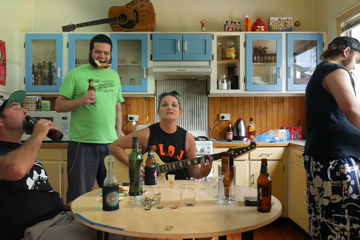Has there ever been a species as uniquely vain as the human race? No other creature that is or was has ever been more preoccupied with the minutia of its appearance. Mankind's obsession with its looks has been an evergreen truth since time immemorial, but arguably in our current epoch - a world of duck-faced selfies, face-tuned filters, and butts that break the internet - our pursuit and worship of superficial beauty has reached its zenith.
But what does any of that have to do with a 17th-cenutry libertine icon? Quite a lot, according to Sport for Jove Theatre's Artistic Director Damien Ryan. As he prepares to revive the company's award winning 2013 production of Edmond Rostand's swashbuckling rom-com, Cyrano de Bergerac, the way our contemporary society values an attractive exterior over a poet's soul offers a telling resonance with this play's central themes.
"If he were around today, I doubt Cyrano would have a Facebook profile. Or if he did, it certainly wouldn't have a picture. It would probably be a continuous commentary on other people's posts," Ryan smiles. "It is pretty uncanny how much of this narrative could very comfortably fit within the context of social media. We have characters who are obsessed with the aesthetic, obsessed with physical beauty and essentially obsessed with the selfie. You also have a character who hides out of sight, but who still wants to put something of himself out into the world, and so seeks anonymity. As Cyrano himself says, 'I've spent my life prompting others from the darkness.' There's definitely a brilliant, modern take you could give this narrative in our digital age of absolute self-obsession."
Sport for Jove's production — featuring a translation of the original French verse by Ryan, who will also star in the title role — is more faithful to Rostand's intended period setting, but this does little to dull the potency with which this story connects with a contemporary audience. Written in the late 1890s, it is a bravura biopic, amplifying the story of the title character's life and loves to the level of an extravagant caricature.
"This play looks at humanity's sense of self and how we can be so disproportionately poisoned by one aspect of ourselves."
Don't miss a beat with our FREE daily newsletter
Hercule Savinien Cyrano de Bergerac is a man of supreme wit and talent. He is a brave and noble soldier, a gifted poet and a virtuosic musician. Sensitive, charismatic, and brimming with swaggering panache, he is the very embodiment of chivalry. But despite these impressive credentials and his burning desire for his distant cousin, the exquisite Roxane, his self-confidence is dashed by a cruel twist of genetic fate: Cyrano has an astonishingly large nose. Believing this abnormality makes him far too ugly to stand a chance with the woman he dearly loves, he agrees to secretly assist another suitor, an exceptionally handsome yet woefully dim cadet named Christian, to woo Roxane. It is an undertaking of both ecstasy and agony, as he vicariously confesses the depths of his passions, while simultaneously sacrificing any hope that Roxane might one day look past his vexing features and see the beauty within.
It is indeed easy to superimpose this narrative onto today's bittersweet struggle to fine-tune and control the way we are perceived and admired - who among us hasn't agonised over an unflattering photo or a poorly judged tweet? But it isn't just our 21st-century milieu who have found themselves reflected in this story's universal dilemmas. Rostand's genius, Ryan believes, is in the subtle complexities beneath the crowd-pleasing spectacle of this story, which has consistently struck a chord with generation after generation since it was first performed a little under 120 years ago, including in no less than ten film adaptations.
"It's such a complete theatrical experience. I think what he [Rostand] managed to achieve was a very rare thing. He was writing this play at the same time that Ibsen and Chekhov and Shaw were changing the whole nature of theatre, moving away from those grand, pictorial melodramas and moving into realism and naturalism, exploring really convincing portraits of humanity's physiological detail. Rostand achieves all of that as well - everything in this play is very psychologically true - but he does so through a vernacular of pure entertainment," Ryan notes. "There's nothing flippant about these characters - in fact, he makes every character flawed in their own perception of themselves. This play looks at humanity's sense of self and how we can be so disproportionately poisoned by one aspect of ourselves."
With its courtly excesses, rhyming couplets and prosthetic shnoz, it would be easy to assume Rostand's intent was purely comical. But, much like Cyrano himself, Ryan insists that beneath a superficially silly surface beats a profoundly emotional heart. "It's the same as the greatest tragedies - he achieves exactly what Shakespeare achieves in Hamlet or what Sophocles achieves in Oedipus," Ryan explains. "It's incredibly moving, but it's done in a way that is undeniably mainstream entertainment. It's exciting, it's thrilling, it's such an adventure. And that's why it has worked again and again and again: because it's very true, very honest, and very, very charming."
Sport For Jove presents Cyrano de Bergerac, 15 Jun — 24 Jun, Seymour Centre, 28 Jun — 1 July, Canberra Theatre Centre, and 13 — 16 Sep, Illawara Theatre Centre.















